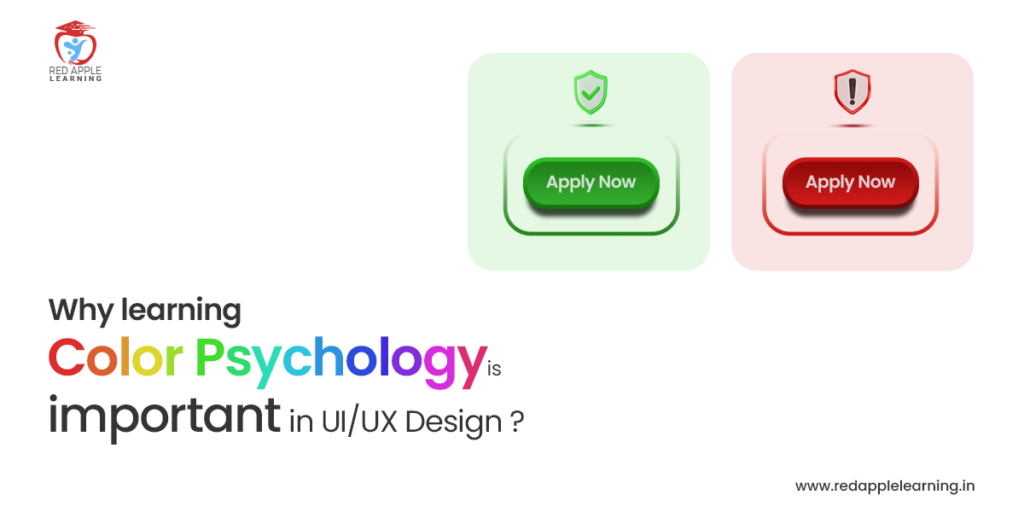Why Learning Color Psychology is important in UI/UX Design?

In the kaleidoscope of user experience, colours serve as the palette that paints emotions, triggers behaviours, and shapes perceptions. The amalgamation between colour and psychology forms the bedrock of compelling UI/UX design, where every hue, shade, and contrast communicates a subtle language to captivate, engage, and guide users through their digital journey. Understanding the significance of colour psychology in this realm is akin to wielding a magician’s wand, empowering designers to craft immersive experiences that resonate deeply with their audience. Let’s embark on a journey to unravel the five compelling reasons why learning colour psychology is paramount in UI/UX design.
Here are the Five Compelling Reasons Why Learning Colour Psychology is Important:
Emotional Impact and Brand Identity
In the vibrant tapestry of colour, each hue weaves a unique emotional thread. Colours evoke distinct feelings and perceptions deeply ingrained in human psychology. For instance, the passionate allure of red signifies excitement, while the calming aura of blue instils trust and reliability. Brand identity thrives on this emotional resonance, as exemplified by brands like Coca-Cola leveraging red to evoke energy and enthusiasm or Facebook’s use of blue to convey trustworthiness and stability. Understanding the emotional impact of colours enables designers to align brands with the desired emotional response, forging powerful connections with users.
Enhanced User Engagement and Accessibility
Colours not only stimulate emotions but also dictate user engagement and accessibility. The strategic use of contrasting colours enhances readability, ensuring content is accessible to all users, including those with visual impairments. Consider the high contrast between text and background colours on platforms like Medium, facilitating ease of reading. Moreover, colour harmony and hierarchy guide users’ attention, steering them toward essential elements and calls to action. For instance, the use of vibrant colours for primary buttons or notifications prompts users to take desired actions, enriching their experience.
Cultural and Contextual Relevance
Colors possess diverse cultural meanings, and their interpretation can vary significantly across different regions and demographics. For instance, while white symbolizes purity in Western cultures, it signifies mourning in some Eastern cultures. Now, understanding these cultural nuances is crucial in creating globally inclusive designs. Contextual relevance further emphasizes the importance of colour psychology; for example, using red to indicate errors or warnings aligns with the universal understanding of danger or alerts, enhancing user comprehension across varied contexts.
Psychological Persuasion and Decision Making
The psychological impact of colours extends to influencing users’ decision-making processes. Subtle manipulations through colour choices can nudge users towards specific actions. A prime example is the ‘Add to Cart’ button on e-commerce websites, often adorned in vibrant shades like orange or red, leveraging the psychological triggers of urgency and action. Similarly, financial institutions employ calming shades like green or blue to instil a sense of security and trust, encouraging users to make financial decisions.
Consistency and User Experience Cohesion
Consistency in colour usage fosters a cohesive user experience. Designing with a consistent colour palette across different elements of a UI/UX ensures visual harmony and aids in navigation. Brands like Google employ a consistent colour scheme across their various applications, establishing a cohesive ecosystem for users. This consistency not only enhances recognition but also streamlines the user experience, promoting familiarity and ease of use.
What is the Best Way to Learn UI/UX Design?
The best way to learn UI/UX designing is through our UI UX design courses in Kolkata. These courses will assist you in learning about every topic precisely. There are several topics in UI/UX designing that are very crucial to learn, and with the proper guidance of experienced mentors, you can delve into the intricacies of wireframing, user research methodologies, interface design principles, interactive prototyping tools, and usability testing techniques. These courses provide hands-on experience, enabling you to grasp theoretical concepts while practicing on industry-standard software fostering a comprehensive understanding of prototyping techniques. Through mentorship, you gain insights, receive constructive feedback, and learn to apply design thinking to real-world scenarios, honing your skills and preparing you for a successful career in UI/UX design.
To Wrap Up
In the vibrant canvas of UI/UX design, colour psychology emerges as an indispensable tool, wielding the potential to sculpt user perceptions, emotions, and actions. From eliciting emotions to influencing decisions and fostering inclusivity, the strategic understanding of colour psychology harmonizes aesthetics with functionality, culminating in captivating user experiences that leave an indelible mark. As designers delve deeper into the realm of colour psychology, they unlock the magic that transforms digital interactions into immersive journeys, resonating deeply with users across the globe.
